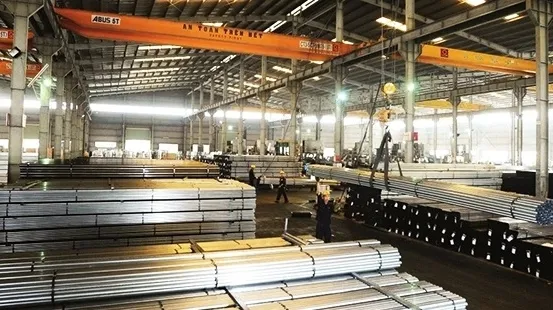Vietnam’s steel industry faces strong pressure

A preliminary estimate puts the capacity of Vietnam’s steel industry at 30 million tonnes a year, though the operating capacity is equivalent to 63-65% of total design capacity. For construction steel, the annual capacity has reached 12 million tonnes but the annual demand for such steel was just 7-9 tonnes in recent years.
Other categories of steel also have their respective capacities at double the demand.
Although Vietnam’s steel production capacity has been growing rapidly, the country still imports nearly 5.7 million tonnes worth US$4 billion each year, half of which comes from China. At the same time, many foreign steelmakers are shifting their production to Vietnam, worsening the situation.
Recently many shipments of Vietnamese steel have been blocked due to anti-dumping and anti-subsidy taxes in many countries. Last May, the US Commerce Department announced its intention to impose duties on Vietnamese steel considered to have originated in China.
Early this year, the EU launched safeguard investigations into 26 steel product categories, including six from Vietnam. If Vietnam is found to have violated rules of origin, its steel products will be taxed, instead of the preferential tax rate of 0%.
Steelmaking is considered a dirty industry, and many countries have recently tightened their environmental standards and curb energy consumption, leading to higher production costs and lower profits, forcing companies to relocate their factories with outdated technologies to countries where the rules are more relaxed.
In the past five years, China have taken strong measures to restructure its steel industry and relocated many of its steel projects abroad, to such places as ASEAN and Vietnam.
In Dong Nai province, China’s Yongjin is seeking to invest in a cold-rolled stainless steel factory with a capacity of 300,000 tonnes a year, raising concerns among local steelmakers and the Vietnam Steel Association (VSA). The association has submitted a report to the government and relevant agencies, calling for careful consideration to be given to the project.
The VSA proposed that the government should only encourage investment in projects that make high-quality steel used for manufacturing, shipbuilding and car manufacturing that local steelmakers have not been able to produce.
A number of industry experts have expressed their agreement with the VSA because Vietnam is becoming a transit point for Chinese steel to avoid taxation.
Associate Professor To Duy Phuong from the Vietnam Foundry and Metallurgy Science and Technology Association stated that Vietnamese steelmakers might be inadvertently affected by Chinese steelmakers’ scheme to disguise the origin of their products.
In order to mitigate the impacts of protectionist measures on Vietnamese steel exports, experts have advised that local manufacturers should innovate their technologies and improve the competitiveness of their products while learning about the laws of international trade and import countries.





